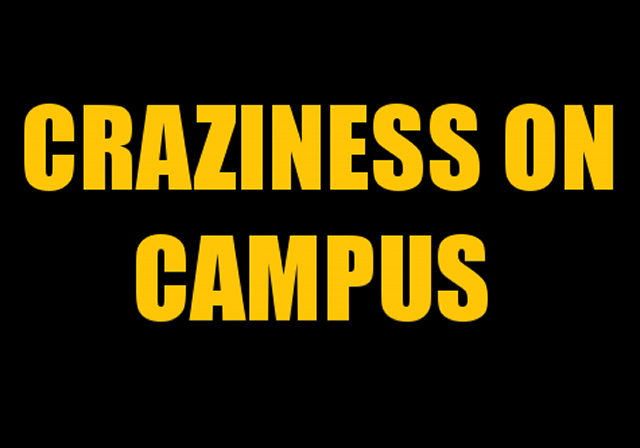Some Colleges Now Requiring Students to Give Details of Their Sexual History to Register for Classes
“This course is mandatory…If you do not complete the training by this date you will receive a registration hold until the training is complete.”

This is done in a roundabout way through mandatory Title IX training, but the end result is the same.
Hans Bader writes at Minding the Campus:
College Students Required to Detail Sexual History Before Registering for Classes
Colleges are increasingly demanding that students disclose details of their private lives in Title IX training. For example, Campus Reform reported that a “mandatory online course at the University of Southern California (USC) asks students to disclose the number of sexual encounters they have had over the past three months” as part of its “Title IX training.” This might well violate students’ rights under state law to privacy or freedom from compelled speech.
A college email told students they must complete the Title IX training in order to register for courses. “This course is mandatory…If you do not complete the training by this date you will receive a registration hold until the training is complete.” Some students at USC found the training too intrusive. “It was just full of super personal questions,” Jacob Ellenhorn, a student at USC, told Campus Reform.
A federal appeals court allowed a woman to sue for constitutional privacy violations over questions that required her to discuss her home life, in Robinson v. Reed (1978). She sued over a race-relations seminar that delved into “attendees’ personal, private, and off-duty lives.” The court explained that the “government may not require an individual to relinquish rights guaranteed by the First Amendment as a condition of public employment. Inquiries into personal beliefs and associational choices come within this protection.” Similarly, that appeals court ruled that people can sue over disclosure of the “most private details” of their life, in Fadjo v. Coon (1981).
The University of Southern California is a private university, not the government. But students have been subjected to similarly intrusive questionnaires at state universities, which are bound by the federal Constitution, including its free-speech and privacy guarantees, because state universities are considered arms of the government. The Supreme Court has made that clear over and over again.
 DONATE
DONATE
Donations tax deductible
to the full extent allowed by law.








Comments
if a university “is a private university”, but receives funds from the government (state for federal), does this not make it subject to free-speech and privacy guarantees?
in fact, since the university is situated within the United States of America, does this not make it subject to those guarantees found in the US Constitution?
To answer your second question: no, it does not.
Short explanation: the text of the first amendment of the US Constitution only restricts actions by the federal government. It wasn’t until the 1920s that the Supreme Court began ruling that those restrictions to actions by state governments, The first amendment’s restrictions don’t apply to non-government actors like private universities.
Authoritarians everywhere are capitalizing on the fact that if they impose repression quickly and thoroughly enough, courts can take years or decades to provide a remedy. By that time the repressions are widely accepted as a permanent fixture.
Die Gedanken sind frei. If I say I’ve always been celibate, who will deny it? And if anyone does, why would they be believed instead of me?
I’d think a little stiffness of spine would fix much of this. Are they going to run inquisitions, complete with bootleg, secretly recorded sex videos to disprove my claim?
Which is not to deny the problem. It used to be that one could maintain a low-profile at the mandatory diversity “training” and get away with it, but increasingly these “trainings” are requiring public confessions of sin, with career-threatening consequences for failure to perform.
(Since forced confessions are by definition insincere, and since no one believes them anyway, the purpose of the training would appear to be primarily a demonstration of power: “See! I can make you publicly abase yourself, so who has privilege now?”)
Private university or not, in what universe is the university entitled to details of a student’s sexual history or anything else to do with their strictly private lives? I can’t imagine even Title IX is this intrusive. And how does demanding answers to these questions qualify as “training?”
How much will students write about their aural sex? Aural sex: that which they openly brag about to friends.
They tolerated vaccine mandates—didn’t protest, stayed in school.
I don’t feel for them.
No one should answer such questions.
That said, such outrageously intrusive questions strike me as demanding outrageously false responses. “In the past three months I had phone sex with cisgendered squirrels 4,321 times, with trans dolphins twice, and with yo mama once (qnal).”
Agreed. When a college asks questions it has no business asking, the applicant should give the answer that will be the “right” answer and that will lead to the least additional questioning. Truth and falsehood are irrelevant in such a situation.
This article references a current Hans Bader article (October 27, 2021), which he’s the USC story from a 2016 article in Campus Reform. No new information added since 2016, no interest in confirming the practice was still in place or the reaction to the surveys. Poor journalism by Mr. Bader and Mr. LaChance. BTW, the best survey answer would have been ‘Ask your mother’.